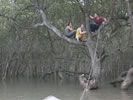Eye For Film >> Movies >> Black Water (2007) Film Review
Crocodile Dundee has a lot to answer for.
In one sense, Paul Hogan's breakout film of 1986, coupled with a series of commercials that he did for the Australian Tourist Commission at roughly the same time, helped put Australia on the international map - but by reducing the Australian national character to the exportable mythology of the 'jolly bushman', Hogan created an image that the country has been trying to live down ever since.

And so, the backlash. In 2005, Greg Mclean finally took vengeance with his back-of-beyond horror Wolf Creek, whose outback antagonist quotes Crocodile Dundee with relish ("that's not a knife - this is a knife") while slashing, torturing and raping his way through the Hogan stereotype - and now, writer/director duo David Nerlich and Andrew Traucki have debuted with Black Water, a new crocodile film that, like Wolf Creek, puts paid to the cosy old iconography, with a killer premise that might just make tourists think twice about venturing down under.
Urbanised sisters Grace (Diana Glen) and Lee (Maeve Dermody) and Grace's boyfriend Adam (Andy Rodoreda) have just finished spending Christmas with the girls' mother (Fiona Press) in the Northern Territory. With several days of vacation left, the three tourists' first stop is a crocodile farm where from a safe distance they watch a penned (but still dangerous) salt-water croc being baited and fed by an expert. They lark about in the jaws of a model specimen, laughing. Later that evening, Grace discovers she is pregnant.
Next morning, they go on a fishing trip in a beautiful complex of estuaries and tributaries - when suddenly their tin boat is overturned, their local guide Jim (Ben Oxenbould) disappears into the water, and they find themselves, like the three little monkeys in the childrens' song, cowering together in the branches of a mangrove tree as a giant 'saltie' lurks in the dark water below, just waiting to go snap. Cut off from all contact with the outside world, in devilish heat, with no food or water, the city slickers are truly up the creek without a paddle - and as all three come under repeated attack, it quickly begins to look unlikely that any will live to see in the New Year.
Based, as they say, on true events (but with fewer survivors than the real story that inspired it), Black Water is essentially Open Water (2003) with a big crocodile instead of sharks, demonstrating the fragile veneer that can exist between our lives of civilised comfort and a more savage world of pain and death. Like Open Water, it is a micro-budget film with a tiny (and diminishing) cast; like Open Water, it features a terrifying night-storm sequence in which only the odd flash of lightning illuminates the horrors at the water's surface; and like Open Water, the toothsome creatures that it depicts are very real (courtesy of some clever digital compositing of actors, crocs and locations, all done on Nerlich's laptop computer). Indeed, during filming, one camera was actually chomped by a fifteen-footer (called Stumpy), and then retrieved with its extraordinary 'dinner POV' footage still intact.
Still, Traucki and Nerlich really sink their teeth into the formula, exploiting the crocodile's relative invisibility in the film's first half to build near unbearable tension from even the tiniest splashing sounds or surface bubbles; and once the attacks recommence, they come as explosions of panicky confusion and vicious, primal terror. Just as importantly, the characters remain entirely convincing in their hopes and fears, and act recklessly only as a result of the utter helplessness of their predicament. In a watertight script, no option available to the characters is left unconsidered, and each has its deadly downside, leaving viewers to wonder what they themselves would have done in similar circumstances, forced to look right into the jaws of death. Meanwhile, the stunning settings bring a naturalistic brand of poetry to all the mandibles and mortality.
Black Water may be derivative, but it ain't no crock - and if you have not yet had your fill of antipodean aquatic lizards on the rampage, you can still look forward to Rogue (2007), Greg Mclean's crocodile-themed follow-up to Wolf Creek. So once again, as in the good old pre-Dundee days of Picnic At Hanging Rock (1975), Long Weekend (1978), Mad Max (1979) and Razorback (1984), Australia has become a place of uncivilised ferocity and uncharted terror - well worth a visit.
Reviewed on: 10 Dec 2007


















